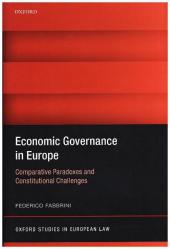 Neuerscheinungen 2016Stand: 2020-02-01 |
Schnellsuche
ISBN/Stichwort/Autor
|
Herderstraße 10
10625 Berlin
Tel.: 030 315 714 16
Fax 030 315 714 14
info@buchspektrum.de |

Federico Fabbrini
Economic Governance in Europe
Comparative Paradoxes and Constitutional Challenges
2016. 352 S. 240 mm
Verlag/Jahr: OXFORD UNIVERSITY PRESS 2016
ISBN: 0-19-874913-9 (0198749139)
Neue ISBN: 978-0-19-874913-4 (9780198749134)
Preis und Lieferzeit: Bitte klicken
Offering an comparative examination of the constitutional implications of the Euro-crisis on vertical and horizontal relations of power in the EU, this book proposes new ways in which to perfect the governance of Economic and Monetary Union.
The Euro-Crisis and the legal and institutional responses to it have had important constitutional implications on the architecture of the European Union (EU). Going beyond the existing literature, Federico Fabbrini´s book takes a broad look and examines how the crisis and its aftermath have changed relations of power in the EU, disaggregating three different dimensions: (1) the vertical relations of power between the member states and the EU institutions, (2) the
relations of power between the political branches and the courts, and (3) the horizontal relations of power between the EU member states themselves.The first part of the book argues that, in the aftermath of the Euro-crisis, power has been shifting along each of these axes in paradoxical ways. In particular, through a comparison of the United States, Fabbrini reveals that the EU is nowadays characterized by a high degree of centralization in budgetary affairs, an unprecedented level of judicialization of economic questions, and a growing imbalance between the member states in the governance of fiscal matters. As the book makes clear,
however, each of these dynamics is a cause for concern - as it calls into question important constitutional values for the EU, such as the autonomy of the member states in taking decision about taxing and spending, the preeminence of the political process in settling economic matters, and the balance
between state power and state equality. The second part of the book, therefore, devises possible options for future legal and institutional developments in the EU which may revert these paradoxical trends. In particular, Fabbrini considers the ideas of raising a fiscal capacitiy, restoring the centrality of the EU legislative process, and reforming the EU executive power, and discusses the challenges that accompany any further step towards a deeper Economic and Monetary Union.
Since the beginning of 2010, the State debt crisis has dominated the debate on economic governance in Europe. Legal literature (as well as writings in other disciplines) is abundant. What has been missing up to now is a comprehensive scholarly monograph on economic governance in Europe in the current situation. Fabbrini presents this monograph, and this alone is a considerable achievement... The book fills a strongly felt need. Academic discussion must be systematized and focused on the real core points, and it requires methodological soundness. The debate will gain progress through critical discussion of Fabbrinis main assumptions. Matthias Ruff, Common Market Law Review
Federico Fabbrini is Associate Professor of European & International Law at iCourts (Center of Excellence on International Courts), Faculty of Law, University of Copenhagen. He holds a PhD in Law from the European University Institute and clerked for Justice Sabino Cassese at the Italian Constitutional Court. He is the author of four edited volumes and two monographs, including Fundamental Rights in Europe: Challenges and Transformations in Comparative
Perspective (Oxford University Press, 2014).


